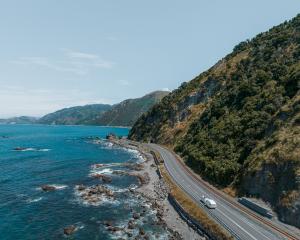Lake Tutira, lazy and timeless, sleeps under the kind of countryside that's every bit as large as the characters within it.
The northbound traveller, having ambled around a saddle snaking high above pine-covered hills, is greeted by green willow trees before the lake looms into view, majestic and silver.
Far fewer choose to make the left-hand turn from State Highway 2 at the shop, passing up one of New Zealand's most prized native wildlife reserves - and Hawkes Bay's most spectacular waterfall.
Tutira is where my family once farmed, sank handles at the pub and played golf at the local course, which has since reverted to a sheep farm.
My mother, a teacher at the local school, and my father, Tutira-raised, met here in the mid-1970s.
An old friend of theirs is still here, running a large farm while trying to nurture both Tutira's ecology and profile, and we decide to pay him a visit after seeing Shine Falls.
Goats, rabbits and turkeys plod around in paddocks along our 20-minute meander past sheep stations and through rows of poplars before we arrive at the falls' walkway entrance.
The Boundary Stream reserve was created near here in 1976 and today, within an 800ha mainland island bordered by waterways, kokako, brown kiwi and the North Island robin play amid what forest eco-systems once were.
The trek to the falls crosses a paddock framed against a sheer cliff face, before the trail ducks under native bush boasting kanuka, kawakawa, kowhai and titoki.
A fat-chested kereru, first mistaken for just another tui, noisily flaps on to a branch above us.
The sound of the falls, tumbling nearly 58m into a shallow pool, precedes the marvel itself.
Our clothes are dampened by spray as we linger around the mossy rock pools at its feet, our heads craned upwards in astonishment.
It's a spectacle that belongs on a Hawaiian travel brochure - not the backblocks of heartland Hawkes Bay.
Later, we call in to the shop for a yarn with owner Kay Dornan, who has expanded the outfit into a cafe selling pancakes and eggs benedict.
MY father's childhood friend and one of the community's long-standing pillars, Blue McMillan lives in a beautiful old homestead overlooking the lake with his English-born wife, Helen.
He came here from Gisborne as a 6-year-old in the early 1960s after his family secured a farm ballot and, for the most part, he's been here since.
It's a lovely spot, he tells us, but it's the people who keep him here.
"Before the forestry industry moved in, we had so many activities here in the district and everyone was involved - we had pony clubs, golf, cricket, rugby and fundraising for all of those things.
"Those were fun days, but I don't think we'll see another time like that."
The couple rent a rustic little lakeside cottage below their section for $200 a night and next door, what was recently an old woolshed has been converted into a function venue, complete with a bar and long dining tables crafted from rimu.
Another chunk that Blue recently dragged from the bog is fast becoming a coffee table in his workshop up the hill.
He gives a doubtful chuckle when we comment, quite convinced, that Aucklanders would be falling over each other to book the place for a wedding venue, if only they knew about it.
"Sometimes we get people who will catch the moment when the weather's good and decide to stay here ... it's pretty quiet and low-key, so they enjoy that."
In a block beyond the lake's backdrop ridge, Blue will soon begin a new planting project, with scores of kanuka set to go in the ground.
I consider asking him whether he's Tutira's reincarnate William Herbert Guthrie-Smith - the district's famous naturalist and conservationist, whose legacy abounds here - but sense prevails.
A little further up the road, at Putorino, we meet Bill Ward, another old district identity with a hearty chuckle, for a yarn at the Waikare Hotel.
His family ran the pub, a highwayside classic, for 75 years over three generations before he retired after 30 years manning the taps.
"Ten years last Monday," adds Bill, who still lives in his old family home a short hobble away.
An oft-told story about two out-of-towners who stopped by and ordered a "fluffy duck" - and were curtly advised by Bill's father, Artie, they could either have a jug or f*** off - remains local legend.
"The original bar was a straight counter, then in 1956 he put a horseshoe bar in and we used to stand around it with hoses and the like coming out of it ... I shifted the straight counter back in 1973, a couple of years after I took over."
We spend the night back at Waipatiki Beach Holiday Park, peering out over a stretch of light-brown beach jammed between two grassy heads, and see out the last of the Hawkes Bay sun fittingly with a bottle of wine.
Naturally, it's agreed we'll be back.












